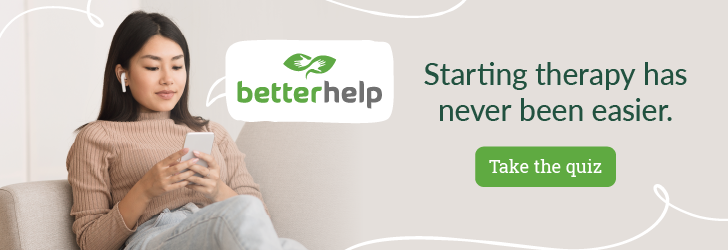Full Disclosure: Clicking on these links could mean a tiny commission for me, at no extra cost to you.
We all experience moments of emotional distress. While some find these issues short-lived and require no intervention, others may benefit greatly from talk therapy, which has the potential to profoundly impact your emotional state, mental health and perspective on life. Whether you’re grappling with the loss of a loved one, navigating a medical illness, or grappling with feelings of anxiety, stress, or depression, it could be worthwhile to explore talk therapy as an option.
Best Online Therapy Services
- Best for Availability: BetterHelp
- Best for Couples: ReGain
- Best for Psychiatry: Brightside
- Best for Teens: Teen Counseling
- Best for Anxiety and Depression: Brightside
- Most Affordable: Grouport
- Best for LGBTQIA+: Pride Counseling
What is Talk Therapy?
Ad

Talk therapy, also known as psychotherapy, is a form of therapy that provides you with a safe space to explore your thoughts, feelings, and behaviors. It aims to unearth the roots of your struggles in a healthy way to help you heal from whatever struggles you’re facing.
- Talk therapy introduces new and effective coping mechanisms for managing distress and its effects on your life.
- It offers opportunities for healing from anxiety, depression, trauma, and other mental health challenges.
- Engaging in psychotherapy provides a safe space to discuss your mental health concerns with a trusted and impartial professional.
- The positive effects of talk therapy can significantly enhance your quality of life and overall well-being.
- Participating in therapy may also reduce the long-term risks associated with mental health conditions.
Benefits of Talk Therapy
The benefits of talk therapy extend far beyond immediate relief from distress. It can significantly improve your quality of life, enhancing your relationships and boosting your self-esteem. Going to therapy can alleviate symptoms of anxiety and depression as well, as therapy will equip you with coping strategies to handle future challenges more effectively.
Here are a few of the invaluable benefits of starting therapy:
-
Better Self-Understanding: Talk therapy provides a safe and supportive environment for you to explore your thoughts, emotions, and behaviors. Through this process, you gain insight into the underlying factors contributing to your challenges and develop a deeper understanding of yourself.
-
Improved Coping Skills: Therapy sets you up with practical tools and techniques to manage stress, regulate emotions, and cope with life’s challenges. You learn adaptive strategies for problem-solving, communication, and conflict resolution, allowing you to navigate difficult situations more effectively.
-
Reduced Symptoms: Talk therapy has been shown to alleviate symptoms of depression, anxiety, trauma-related disorders, and obsessive-compulsive disorder (OCD). Through therapy, you learn to challenge negative thought patterns, overcome limiting beliefs, and develop healthier coping mechanisms.
-
Enhanced Relationships: Therapy can improve interpersonal relationships by encouraging empathy, communication, and boundary-setting skills. You learn to express your needs and emotions more assertively, navigate conflicts better and develop healthier relationship dynamics.
-
Increased Self-Esteem: Talk therapy helps you channel self-compassion, self-acceptance, and self-confidence. Through supportive guidance and validation from the therapist, you learn to recognize your strengths, value your worth, and embrace your true authentic selves.
-
Personal Growth: Therapy facilitates personal growth by encouraging you to set and pursue meaningful goals, explore their values and aspirations, and identify areas for development. After this type of therapy, you have a greater sense of purpose, fulfillment, and resilience.
-
Develop Problem-Solving Skills: Therapy teaches you effective problem-solving strategies and decision-making skills. This enables you to approach challenges with greater clarity and resourcefulness. You learn to identify obstacles, brainstorm solutions, and take proactive steps toward achieving your goals.
-
Empowerment and Control: Talk therapy empowers you to take control of your life and make positive changes. You learn to identify and challenge unhelpful patterns of thinking and behavior, break free from self-limiting beliefs, and reclaim control over their thoughts, feelings, and actions.
Overall, talk therapy offers a holistic approach to mental health and well-being, promoting emotional healing, personal growth, and the fulfillment of one’s potential.
Types of Talk Therapy
Finding the right therapist is just a piece of the puzzle. It’s equally important to explore the different talk therapy methods available. The great thing? There’s a wide range of options out there, so you’re likely to discover one that clicks with you.
According to the American Psychological Association, there are five main categories of psychotherapy. These include:
- Cognitive Behavioral Therapy (CBT): CBT is a structured, time-limited therapy that focuses on identifying and changing negative thought patterns and behaviors. It’s particularly effective for anxiety, depression, and specific phobias. You can do Cognitive Behavioural Therapy online through online therapy platforms such as Better Help.
- Dialectical Behavior Therapy (DBT): DBT combines CBT techniques with mindfulness practices. It’s designed to help you manage intense emotions and improve interpersonal relationships, making it ideal for people with borderline personality disorder or self-harm tendencies.
- Psychodynamic Therapy: This therapy focuses on how unconscious processes from past experiences affect current behavior. It’s a path to deep self-reflection and understanding, suitable for anyone looking to resolve deep-seated emotional conflicts.
- Humanistic Therapy: This therapy encourages self-exploration and self-actualization. It’s a powerful healing modality for those seeking to improve self-awareness and personal growth.
- Integrative or Holistic Therapy: Integrative therapy uses an approach that combines elements from various therapeutic modalities to fit the individual’s unique needs for optimal healing.
Other Types of Talk Therapy
If you don’t resonate with the five main types of therapy mentioned above, there are still plenty of options to choose from. And remember, finding the right therapist and using the right type of therapy is imperative to your success. So, take the time to explore the various types of talk therapy and the unique approach and techniques each one has to offer.
Some common types include:
-
Psychodynamic Therapy: Explores unconscious patterns and past experiences to understand and resolve current issues.
-
Humanistic Therapy: Emphasizes self-exploration, personal growth, and the importance of the present moment.
-
Interpersonal Therapy (IPT): Targets interpersonal issues and relationships to improve communication and problem-solving skills. It can be used for everything from relationship counseling to fixing relationships with friends and family members.
-
Acceptance and Commitment Therapy (ACT): Helps you accept your thoughts and feelings while committing to actions aligned with your values.
-
Mindfulness-Based Therapy: Utilizes mindfulness practices to increase awareness, reduce stress, and promote emotional regulation.
-
Family Therapy: Involves the entire family in therapy sessions to address relational dynamics and communication patterns.
-
Group Therapy: Provides support and guidance in a group setting, allowing you to share experiences and learn from others. You can opt for group therapy in-person or through online group therapy platforms like Grouport.
-
Narrative Therapy: Focuses on challenging and reshaping unhelpful narratives, reshaping life narratives and empowering individuals to rewrite their stories.
-
Humanistic Therapy (Person-Centered Therapy): Emphasizes self-awareness, growth, and empowerment in a supportive, non-judgmental environment.
-
Gestalt Therapy: Focuses on present-moment experiences to increase self-awareness and integrate conflicting aspects of the self using techniques like role-playing and guided imagery.
-
Solution-Focused Brief Therapy (SFBT): Goal-oriented approach harnessing existing strengths to create practical solutions, emphasizing small successes and promoting hope.
-
Rational Emotive Behavior Therapy (REBT): Identifies and challenges irrational beliefs to develop healthier thought patterns and coping strategies.
-
Expressive Arts Therapy: Uses creative expression to promote healing and self-discovery, encouraging you to explore your emotions and experiences through art, music, movement, and drama.
-
Transpersonal Therapy: Integrates spiritual experiences into therapy to promote self-awareness, growth, and connection to something greater than oneself.
-
Eye Movement Desensitization and Reprocessing (EMDR): Specialized therapy for trauma-related disorders, involving bilateral stimulation to reprocess traumatic memories and reduce emotional intensity. It aims to help you overcome intrusive thoughts, nightmares, flashbacks and memories of traumatic events.

Finding the Right Therapist
Finding the right therapist is a crucial step in your mental health journey. It’s essential to find someone who not only possesses the necessary qualifications and expertise but who also resonates with you on a personal level.
Start by identifying your specific needs and preferences. Consider factors such as the therapeutic approach used or that you’d prefer, the therapists specialization, and availability. Take the time to reach out and schedule initial consultations to get a sense of their therapeutic style and how comfortable you feel opening up to them.
Remember that finding the right fit may take some time and exploration. However, investing in a therapeutic relationship that feels supportive and empowering can have a profound impact on your overall experience and wellbeing.
Another key thing to keep in mind is that in-person therapy often has a significant waiting list to get the therapist you want. Online therapy is an excellent alternative, as it connects you the best therapist for you right away. Many online therapy services also provide you with a quick questionnaire to ensure you get the right therapist for you.
Exclusive Offer: Connect With an Online Therapist Today
Questions to Ask a Potential Therapist
When searching for a therapist, be sure to ask about their specialization, approach to therapy, and experience with issues similar to yours. Understanding their approach can help you gauge if they’re the right fit for your therapeutic journey.
Here are some questions to consider:
- What is your therapeutic approach or orientation?
- What experience do you have in treating issues similar to mine?
- What are your qualifications and credentials?
- Are you licensed to practice therapy in this state?
- How do you typically structure therapy sessions?
- What are your fees, and do you accept insurance?
- What is your availability for appointments?
- How do you handle confidentiality and privacy?
- How do you approach cultural diversity and inclusivity in therapy?
- Can you provide references or testimonials from previous clients?
- What are your policies regarding cancellations or missed appointments?
- How do you handle emergencies or crises outside of session times?
- How do you collaborate with clients to set treatment goals?
- What is your take on medication and coordination with other healthcare providers if needed?
- Can you explain the informed consent process and what I can expect from therapy?
These questions for therapists can help you gain insight into the therapist’s approach, expertise, and suitability for your needs, ultimately guiding you to making the best decision for you.
Online Therapy: A Flexible Alternative
Online therapy offers the same benefits as in-person therapy but with added flexibility and convenience. It’s an excellent option for those with busy schedules or limited access to mental health services.
- Best for Availability: BetterHelp
- Best for Couples: ReGain
- Best for Psychiatry: Brightside
- Best for Teens: Teen Counseling
- Best for Anxiety and Depression: Brightside
- Most Affordable: Grouport
- Best for LGBTQIA+: Pride Counseling
Preparing for Your First Therapy Session
Once you have found the right therapist for you, it’s time to start the therapeutic process! Before your first session, reflect on what you hope to achieve through therapy. Setting clear goals can guide the therapeutic process and help measure progress along the way.
Upon your first session, remember to be open and honest. This is a safe space designed for your healing. Communicating openly with your therapist is key to navigating your struggles together.
Lastly, therapy is a journey with ups and downs. Celebrate small victories and be patient with yourself as you navigate this path towards healing and self-discovery.
Exclusive Offer: Connect With an Online Therapist Today

Conclusion
Embracing the journey of talk therapy is a courageous step towards self-discovery and healing. With the right type of therapy and a supportive therapist, you can navigate the complexities of your mind and emotions, laying the groundwork for a more fulfilling life. If you’re seeking a flexible and comforting approach to therapy, consider signing up for online therapy today. Your path to well-being is just a click away.









